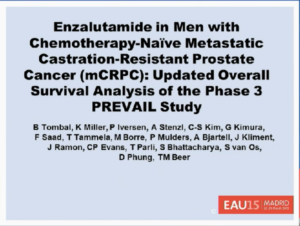Crossing the Rubicon
We’ve heard much about the role of PARP inhibitors in ovarian and breast cancers where there is sensitivity to these agents in women with DNA damage repair defects, but what about advanced prostate cancer?
Following the publication of the phase 2 trial TOPARP in the NEJM in 2015, we’ve been eagerly awaiting the outcome of a series of phase 3 studies with these agents in metastatic prostate cancer in multiple different lines of therapy.

Dr Oliver Sartor at ESMO19
Following on from our daily coverage from ESMO in Barcelona last week where we looked at some of the pros and cons as they appeared during the presentation by Dr Maha Hussain (Chicago) from the PROfound trial, it’s time to share some expert opinions.
The study she presented evaluated the PARP inhibitor, olaparib, versus next generation AR anatgonists abiraterone or enzalutamide in refractory metastatic castrate-resistant prostate cancer (mCRPC). Interestingly, it soon became rapidly clear that many casual observers missed some important nuances from the myriad of top-line news articles and summaries.
The devil, as always, is in the details.
To further our readers education on this important topic, BSB interviewed a prostate cancer thought leader, Dr Oliver Sartor (right) for his personal perspectives and look at the take homes from the lens of an experienced triallist in this niche.
Let’s see what he had to say about PARP inhibitors in advanced prostate cancer, as well as the PROfound and TRITON studies…
To learn more from our latest oncology conference insights and get a heads up on our latest ESMO Coverage, subscribers can log-in or you can click to gain access to BSB Premium Content.
This content is restricted to subscribers
 We’ve been following the updates on the PREVAIL study evaluating enzalutamide (Xtandi) versus placebo in metastatic castrate-resistant prostate cancer (CRPC) in the pre-chemotherapy setting for a while now. It’s interesting to see how the data evolves over time as it becomes more mature.
We’ve been following the updates on the PREVAIL study evaluating enzalutamide (Xtandi) versus placebo in metastatic castrate-resistant prostate cancer (CRPC) in the pre-chemotherapy setting for a while now. It’s interesting to see how the data evolves over time as it becomes more mature. There’s nothing better than seeing good news in the early morning email alerts I have set up on cancer research!
There’s nothing better than seeing good news in the early morning email alerts I have set up on cancer research! Today, it was the turn of Astellas and Medivation to announce the results of the TERRAIN study, which is a primarily European phase 2 trial that began in March 2011 in the prechemotherapy setting for castrate resistant prostate cancer (CRPC). The trial met its primary endpoint of progression free survival (PFS).
Today, it was the turn of Astellas and Medivation to announce the results of the TERRAIN study, which is a primarily European phase 2 trial that began in March 2011 in the prechemotherapy setting for castrate resistant prostate cancer (CRPC). The trial met its primary endpoint of progression free survival (PFS).
 he results of the phase 3 clinical trial of dasatinib (Sprycel) plus docetaxel/prednisone versus placebo and docetaxel/prednisone in men with castration-resistant metastatic prostate cancer (CRPC) are expected soon.
he results of the phase 3 clinical trial of dasatinib (Sprycel) plus docetaxel/prednisone versus placebo and docetaxel/prednisone in men with castration-resistant metastatic prostate cancer (CRPC) are expected soon.